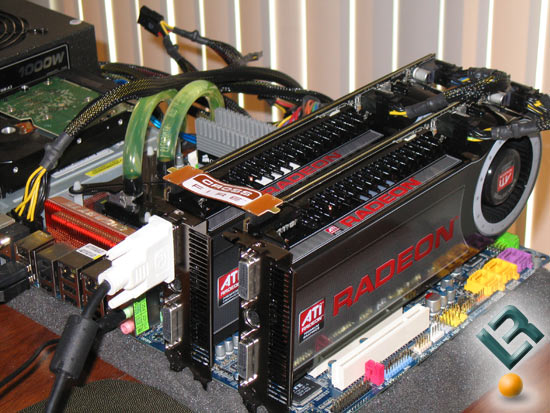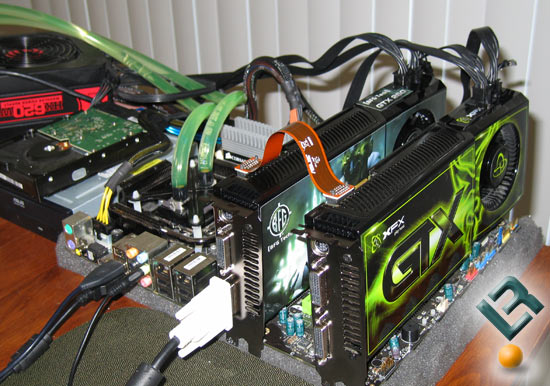AMD Radeon HD 4830 512MB Graphics Card Review
The Test System

The ATI test system was running Windows Vista Ultimate 64-bit with SP1 and all available Microsoft updates. The ATI Radeon HD 4870 X2 was using CCC 8.8 beta drivers. The ATI Radeon HD 4670 and Radeon HD 4550 were using 8.9 drivers. The Radeon HD 4870 1GB, Radeon HD 4850 and Radeon HD 4830 all used Radeon 8.10 drivers. All results shown in the charts are averages of at least three runs from each game or application used.
The Video Cards:
- ATI Radeon HD 4870 X2 – GDDR5(500MHz/1800MHz)
- ATI Radeon HD 4870 1GB – GDDR5 (750MHz/1800MHz)
- ATI Radeon HD 4850 – 512MB GDDR3 (625MHz/1986MHz)
- ATI Radeon HD 4830 – 512MB GDDR3 (575MHz/1800MHz)
- PNY GeForce GTX 280 – GDDR3 (602MHz/2214MHz)
- BFG Tech GeForce GTX 260 – GDDR3 (602MHz/2214MHz)
- ATI Radeon HD 4670 – 512MB GDDR3 (750MHz/2000MHz)
- XFX GeForce 9600 GT – 512MB GDDR3 (650MHz/1800MHz)
- EVGA GeForce 9600 GSO – 384MB GDDR3 (550MHz/1600MHz)
- NVIDIA GeForce 9500 GT – 256MB GDDR3 (600MHz/1000MHz)
- ATI Radeon HD 4550 – 512MB GDDR3 (600MHz/1600MHz)
All of the ATI video cards were tested on our Intel X48 Express Test platform, which is loaded with the latest and greatest hardware. The Intel Core 2 Quad QX9770 ‘Yorkfield’ processor was used for testing as it proves to be the best desktop processor when it comes to game performance. The test system was also loaded with 4GB of memory and water cooled to ensure throttling of the processor or memory wouldn’t cause any issues. The Corsair DDR3 1600MHz memory kit was run at 1600MHz with 9-9-9-24 memory timings. The Gigabyte X48T-DQ6 motherboard was running BIOS version F5, which was the most recent available at the time. It should be noted that the Radeon HD 4870 X2 was run on the Coolermaster 1000W power supply when running in CrossFireX mode as the Corsair HX 620W power supply was unable to handle the load. The Corsair HX 620W power supply would run the cards and was pulling more than 791W from the wall, but the games displayed artifacts and the +12V rail was low. A quick switch to a bigger PSU, and the issue was resolved.
| Intel Test Platform | |||||
|---|---|---|---|---|---|
|
Component |
Brand/Model |
Live Pricing |
|||
|
Processor |
Intel Core 2 Quad QX9770 |
||||
|
Motherboard |
Gigabyte X48T-DQ6
|
||||
|
Memory |
4GB Corsair PC3-1600C9
|
||||
|
Video Cards |
See Above |
||||
|
Hard Drive |
Western Digital SATA RaptorX |
||||
|
Cooling |
Corsair Nautilus 500 |
||||
|
Power Supply |
Corsair HX620W |
||||
|
Operating System |
Windows Vista Ultimate |
||||

All of the NVIDIA video cards were tested on our nForce 790i SLI Ultra test platform, which is loaded with the latest and greatest hardware. The Intel Core 2 Quad QX9770 ‘Yorkfield’ processor was used for testing as it proved to be the best desktop processor when it comes to game performance. The test system was also loaded with 4GB of memory and water cooled to ensure throttling of the processor or memory wouldn’t cause any issues. The Corsair DDR3 1600MHz memory kit was run at 1600MHz with 9-9-9-24 memory timings. The EVGA 790i SLI Ultra motherboard was running BIOS version P06, which was the most recent available at the time. The GeForce 9500 GT, 9600 GT and 9600 GSO used Forceware 177.93 video card drivers while all other NVIDIA graphics cards were run with Forceware 177.83 video card drivers installed.
| Intel Test Platform | |||||
|---|---|---|---|---|---|
|
Component |
Brand/Model |
Live Pricing |
|||
|
Processor |
Intel Core 2 Quad QX9770 |
||||
|
Motherboard |
EVGA 790i SLI Ultra |
||||
|
Memory |
4GB Corsair PC3-1600C9
|
||||
|
Video Cards |
See Above |
||||
|
Hard Drive |
Western Digital SATA RaptorX |
||||
|
Cooling |
Corsair Nautilus 500 |
||||
|
Power Supply |
Corsair HX620W |
||||
|
Operating System |
Windows Vista Ultimate |
||||
Now that we know exactly what the test system is, we can move along to performance numbers.

Comments are closed.